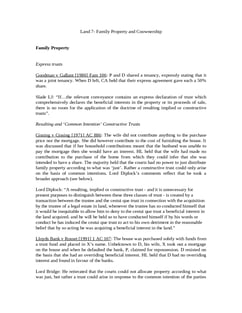State Bank of India v Sood [1997] Ch 276
Judgement for the case State Bank of India v Sood
Table Of Contents
Where a house held on trust for sale was mortgaged to secure past and future advances, the fact that no money was advanced at that time did not permit an occupying beneficiary (resisting a subsequent possession action by the unpaid mortgagee) to claim an overriding interest having priority over the mortgage under s 70(1)(g) of the Land Registration Act 1925.
In such a case, and on the true construction of s 2(1)(ii) of the Law of Property Act 1925, the overreaching of beneficial interests did not depend on compliance with statutory requirements for the receipt by trustees of capital monies.
Non-payment to the trustees is only relevant where capital money arises, which did not occur in the present case, nor, for example, with leases where there is no premium (here the loan was replacing an existing mortgage to restructure debts - not pay any new money to the party in whose name the house existed.
Peter Gibson LJ
Though overreaching is an important doctrine, the current law gives too little protection to parties with beneficial interests.
Hence he supports LC’s idea that a conveyance should not overreach the interest of a sui juris beneficiary in occupation unless he gives his consent.
For Further Study on State Bank of India v Sood
Need instant answers? Our AI exam tutor is here to help.
Ask questions 🙋 Get answers 📔 It's simple 👁️👄👁️
Our AI is educated by the highest scoring students across all subjects and schools. Join hundreds of your peers today.
Get StartedSimilar Cases
Related Product Samples
These product samples contain the same concepts we cover in this case.
| Land Law | Registration Theory Notes (39 pages) |
| Land Law | Trusts Of Land Notes (11 pages) |

